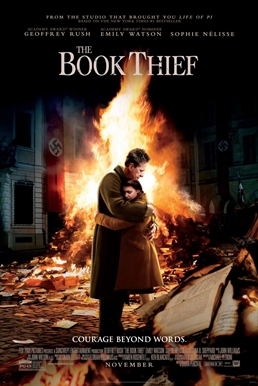Reading it this fall, I loved Markus Zusak's novel The Book Thief after some early struggles catching its rhythm. Once I did, I couldn't put it down. My timing couldn't have been better as a big screen release was scheduled for late November, just a month or so after I finished Zusak's novel. It took me a couple weeks to get out to theaters, but here we are with 2013's The Book Thief.
It's winter 1939, and Liesel Meminger (Sophie Nelisse) has seen her world get turned upside down. After her brother dies, Liesel has to move in with a German family when her mother can no longer care for her. She moves in with Hans (Geoffrey Rush) and Rosa (Emily Watson) Huberman, a middle-aged couple living inthe middle of Germany. A worldwide conflict is turning into a war, Liesel just trying to adjust to her new life with the Hubermans. She goes to school, forms friendships, learns to read and carves out a new life for herself in the midst of Nazi Germany. It's a good if not luxurious life, one Liesel learns to love. That life for Liesel, Hans and Rosa is thrown a curve when a young Jewish man, Max (Ben Schnetzer), arrives on the Hubermans doorsteps seeking a hiding place from the Nazis. They hide him in the basement, life going on somewhat as normal, but the threat of someone finding out is there at all times.
I should probably just save this next paragraph and copy-and-paste it every time I watch a movie after reading the book it was based on. It'd just be simpler, but here we sit just the same. It is the rare movie that is better than the book it is based on. Thanks, Jim Gaffigan, now I feel like a jackass (watch HERE). This was a novel that's pretty daunting to adapt into a feature film. It covers four-plus years during World War II, introduces a dozen or so key characters, and oh yeah, is narrated by Death himself. The threat is that the things that are cut are key to the plot and characters for the sake of time. Thankfully, that isn't the issue. Director Brian Percival and screenwriter Michael Petroni do an admirable job adapting the novel. Yes, certain things are cut, some subplots, some characters, but the heart of the movie is still there and for the better.
The movie's success lives and dies on the shoulders of 13-year old Sophie Nelisse, a young Canadian actress, who does an admirable job bringing Liesel Meminger to life. As if moving in with foster parents wasn't enough, this young girl has to do so in the middle of Nazi Germany as World War 2 approaches ever faster. It's an easy character to like, be sympathetic to and root for in the end. What it comes down to is that this is a really sweet, caring and thoughtful girl. A good start for Nelisse, hopefully a whole lot of more worthy roles coming her way.
The easiest transition from novel to film comes from a great jumping off point. Beyond Liesel, there are some great characters that don't feel like cardboard cutouts, but real, 3-D people with flaws and emotions. The best character is equally thoughtful, caring Hans who becomes more than a stepfather to Liesel. The middle-aged German immediately welcomes her into the house, helping her learn to read, helping her adjust and teaching her most of all to be a good person. The same goes for Watson's Rosa, except she doesn't show it in the same way, yelling and screaming, teaching with the toughest of tough love. We also meet Rudy Steiner (Nico Liersch), the blonde-haired, blue-eyed young German boy living next door who becomes fast friends with Liesel, Max, the desperate young Jewish man looking for another day, another week of living, and Ilsa Hermann (Barbara Auer), the Mayor's wife who shares Liesel's love of reading and gives her an outlet to do so.
One of the coolest aspects of the novel that makes the transition to the film is the narration by Death himself, voiced here by Roger Allam and seen briefly but never directly. The narration is profound in its simple, straightforward approach and thoughts about life, living, humans and ultimately, death. What better time to get a window into Death's thoughts than World War II, a period in human history where millions of lives were claimed. Death has a fascination with Liesel, meeting her at the graveyard when her brother dies. As he globe trots around the world, he keeps coming back to her, curious and interested what she's up to, what she's doing. I liked especially the portrayal of Death itself, not a menacing monster spawned from Hell. Death is simply a being doing a job, one that tortures him with questions about mankind. It's a great character that gives a different layer to the story.
And time for one last rant, quasi-warning. I think it helps going into this book and/or film is that you like reading. It puts the story in a different perspective, Liesel learning to read in a time where books were burned when deemed subversive. She finds one book, steals others and treasures all of them. If there's a weakness, it's that the film doesn't delve into WWII as much as it could have. We know Max can't be found, but the darkness of the Nazis is only vaguely dealt with. The story drags a little bit at 132 minutes, but overall, it's a worthy adaptation for fans of the book and those just curious to see a good movie.
The Book Thief (2013): ***/****


No comments:
Post a Comment